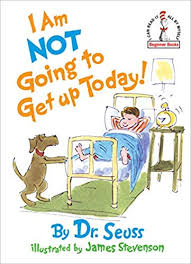

Searching the internet for a picture of “not getting out of bed,” I found that Dr. Seuss had written about this.
So maybe it is a “thing.” Not Thing 1 or Thing 2, but a thing. It seems almost everyone has trouble at times wanting to get out of bed. With the warm covers drawn around us, our head on the pillow, climbing out into the cold air is not appealing.
On top of that, it means we must begin to be responsible.
Lying in bed, we are not in charge of anything. We don’t have to do anything. There is no agenda, no expectations, we are free to relax, doze off, and dream. The rest of the world is removed from us and our problems are “out there,” not necessarily in bed with us.
Getting up means facing whatever it is we must or should be doing.
Staying in bed allows us to put it off. Often, this is putting off the inevitable. In my case, it means my morning is shorter, there is more to do in less time, and it creates stress and anxiety that would not be as acute if I would just get up when I wake up.
Five days after my Psychiatrist increased my Prozac, I had a few days of “Up and at’em.”
This was unexpected and welcome. Unfortunately, this only lasted a few days. I’ve been telling myself that is because of external factors and that I will be back to getting up when I wake up very soon. But that hasn’t been the case yet.
In fact, I am dragging out the process of getting out of bed.
READ: Even the dog got up early today
I am not even telling myself “I need 8 hours of sleep, “or “I got to bed late last night, I deserve to sleep in.” No, now I am just rolling over after looking at the alarm clock, and not getting up. This feels ok when I am doing it, but the long-term consequences of this are pissing me off.
My SMART recovery class is teaching me how to use several tools that would help me with this if I were brave enough to use them.
So far, I have looked at them, paid attention to how they work, and tried them out on a decision or two. But using them for real is way different and much harder. If I do the work, then I feel I must make the change.
Both the CBA tool (Cost-Benefit Analysis) and the Motivational Matrix would show me why getting up has more long-term benefits than the short-term ones I get by staying in bed.
Read More about SMART and the CBA Worksheet
Without even doing either worksheet on paper, I have been doing them in my head. And the result is always the same. The long-term benefits of getting out of bed far outweigh the short-term benefits of a little extra time in the sack. In fact, there are days when I know I would have felt better all day long, had I just gotten up when I woke up.
This morning, I have an appointment with my therapist.
I plan to discuss this with him. My Psychiatrist wants me to check in in another week and let him know how the change in medication dosage is working. This will give me a chance to share what I am experiencing and get his thoughts.
In the meantime, I can stop being a chicken and write out my CBA for getting out of bed.
Seeing it in black and white, on paper will make me pay attention to it. Perhaps that is one reason I have not done it yet. Once I have it where I can see it, I will feel compelled to address it. If I can put off writing it out, I can live in my dream world where addressing getting out of bed is someone else’s problem.
But for now, I have ordered Dr. Seuss’ book. I can’t wait to see how it turns out.
Have you ever just wanted to stay in bed?







Leave a Reply